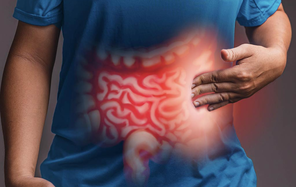 Inflammatory Bowel Disease (Ulcerative Colitis (UC) and Crohn's Disease (CD)) What does a pelvic physio have to offer someone who has IBD? Top Down (stress management + sleep challenges + microbiome support + exercise prescription + lifestyle factors + individualized concerns re: work/play/restoration/meaningful activities) Bottom Up (anal incontinence and/or constipation + bowel functional support/education) treatment, bladder + sexual + pelvic organ support + systemic challenges (skin, joint, eyes…) Focus: What's happening now? What is getting in the way of you enjoying your best, most meaningful life? Write your very unique list. All recent research says that lifestyle (more than medication or surgery) is the #1 most effective way to treat UC and CD or the combo. Facts About IBDs from 2015 - present research: Genetics?: Presence of IBDs has a genetic link, but there is no genetic link to the severity of the disease. Severity of both diseases is clearly linked to lifestyle/diet/smoking/stress management. These are modifiable factors and put you in the driver's seat. Stop smoking immediately (including second hand smoke) - Refer to Alan Carr's book on smoking cessation. Smoking is pro-inflammatory and your job is to reduce inflammation or "put out the fire". Reduce or stop alcohol consumption - 1 - 3x weekly of one beer, one x 5 oz. glass wine or 1 oz. alcohol. No stacking (never more than one at a time). Alcohol impedes a healthy gut microbiome and is pro- inflammatory as well! The Story of IBDs and Fibre? There is no evidence to support a low fibre diet for someone with IBD (most of the time). Fibre is protective for those with IBDs with a minimum of 27 gm fibre/day and preferably 35 - 50 gm fibre/day. It's very old, outdated advice to eat a low fibre diet. Why? - Fibre feeds your microbiome, helps control blood sugar, stabilizes body weight, helps immune regulation in your gut's T Regulator cells, maintains healthy gut barrier to reduce leaky gut, increases the mucous production to keep pathogenic bacteria off gut wall, helps excretion of excess hormones and supports your gut-brain axis (you think more clearly!). Proviso** - If you have a stricture or scar tissue limitations, you may need to eat low fibre until that is released surgically and/or with pelvic physio. Full Circle Physiotherapy and IBDs Page 2 How do you increase your fibre intake? - Low and slow is the motto. Choose one thing from the list below, see how your body responds over 2 - 3 weeks, then try the next. Keep what serves you.
Fatigue - Fatigue is a functional concern for most people with IBDs, but especially women + younger + early stage + if you have pre-existing depression and/or anxiety. Research shows that the experience of IBD related fatigue is very similar to the fatigue people experience while having chemotherapy. Why? - IBD creates an inflammatory state in your body which is anxiety provoking, your gut-brain axis is wobbly (need microbiome support…..see all dietary suggestions above), treatments/surgery are taxing, depression/anxiety/loose stool may interrupt sleep. What can I do about it? - Calm your system/put out the IBD fire, develop a brilliant and varied microbiome, help your system to reduce medical/pharmaceutical/surgical needs by caring for yourself with healthy choices and consistency, then…Practice unwavering, consistent sleep hygiene (daily consistent bedtime and awaken times, safe/comfortable housing, cool room/warm feet, quiet/calm evening routine, no blue lights 1 - 2 hours prior to bedtime, covered windows, no evening snacks, cellphone not in bedroom (no texts/emails/calls during dedicated sleep time), write list for tomorrow on paper/phone and leave it in kitchen)….find what works for you and stick to it every single day/night! Personalized Exercise Programme Daily to 3x/week aerobic + resistance (weights or body resistance) boosts your immune system's response (but studies show that it didn't change bowel function). Aerobic exercise for 30 mins. x 5/week helps support your heart health, gives you a sense of calm (endorphin release) but can activate the bowel. Keep timing and fatigue in mind. Most folks with IBD choose early morning for their run/bike/swim. Calming exercise, like yin yoga and/or a regular gentle stretching routine can help reduce stress, anxiety and promote sleep. No surprise that this can be a lovely part of an evening time to promote sleep and calm the mind. Full Circle Physiotherapy and IBDs Page 3 Mental Health Considerations
Pelvic physios are trained in incontinence of bowel and/or bladder, bowel management (constipation et al.), sexual function/dysfunction, pelvic organ support, persistent pelvic pain and more. Any of these challenges may be within the experience of those who have IBDs. Prehab and rehabilitation from abdominal/pelvic surgeries, including ostomy surgeries, is part of our work as well (scar tissue release, tendomyofascial release, posture, abdominal/pelvic recruitment + strengthening + function and more). As a very specific example, the puborectalis muscle (a sling shaped muscle that wraps around and supports the anorectal canal) can become over-recruited and tight in some people with frequency/loose stool and functionally impedes the movement of the stool as it exits. It then looks like constipation, but is actually the opposite! A pelvic physio can help with manual therapy (releasing the muscle) and teaching you to accomplish this yourself with breath, positioning, your own hands/therawand…..even how/when you toilet. Assessment and treatment are yours to choose/guide. If you contact a pelvic physio, ask if they are trained in anorectal dysfunction prior to your appointment. And if you have any questions or concerns, please feel free to email me at [email protected] and/or peruse my website: fullcirclephysiotherapy.ca. Property of Full Circle Physiotherapy
0 Comments
Leave a Reply. |
Archives
January 2024
Categories
All
|

 RSS Feed
RSS Feed
